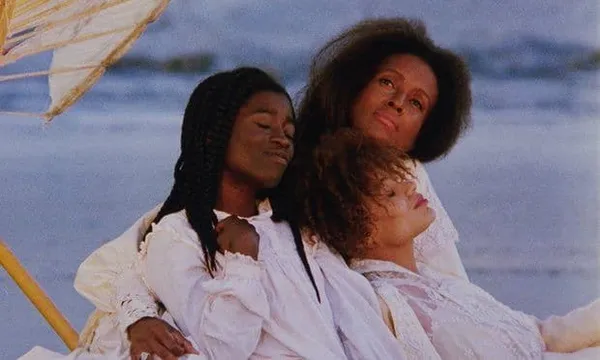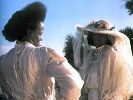Eye For Film >> Movies >> Daughters Of The Dust (1991) Film Review
Daughters Of The Dust
Reviewed by: Amber Wilkinson

"What's past is prologue."
This idea of what has gone before informing the present - as well as a future yet to come, is just one of the themes of Julie Dash's meditation on the identity of one African-American family as, in 1902, they contemplate becoming part of what would go on to be the Great Migration from the rural southern states of the US to the more industrial cities of the north. Premiering at Sundance Film Festival in 1991, it seems incredible that it took until that decade for a film by an African-American woman to make it to general cinema release and few would argue that there's still a long way to go in terms of Hollywood; UCLA's diversity report for 2017 revealed minorities are still massively under-represented in film, losing ground on the previous report in both film writing and directing credits.

Among more positive news, Dash's film has itself ended up as a prologue of a sort for Beyonce's Lemonade, which draws on its influence and has helped bring the film to a new audience. The narrative structure is loose, as we see two members of the Peazant clan, who have already moved to the urban mainland, return to one of the Sea Islands, off the coast of Georgia, where the rest of their family remain, retaining the Gullah practices heavily influenced by their African heritage. One of the prodigals, "Yellow" Mary Peazant (Barbara-O) offers a hint of urbanisation as a corrupting force, while Viola (Cheryl Lynn Bruce) has embraced Christianity since her move to the city. Viola brings with her a photographer Mr Snead (Tommy Redmond Hicks), who has come along to capture the moment of departure. Dash, too, offers us snapshots of the family's life, from the tensions between Eula (Alva Rogers) and her husband Eli (Adisa Anderson), who is unsure whether the child his wife is carrying is his or the product of rape on the mainland, to the opposing forces of the traditional beliefs of the family's matriarch Nana (Cora Lee Day) and the Christianity of Viola.
As the family discusses the ins and outs of the move, prepares a picnic gumbo and plays on the beach, Dash retains an air of mystery and threads her story through with thoughts of what lies beyond - both backwards in time and forwards - via voice-over provided sometimes by Nana and sometimes by Eula's Unborn Child (Kai-Lynn Warren). The importance of remembering the past - including painful details, such as slavery or Eula's rape - is set against what some of the clan see as an "age of beginnings", or as one of them puts it, "The only way to change is to keep moving".
Dash's film, although very specific in terms of the African-American heritage it presents, is also more universal, its woman-dominated story speaking to more wider female experience, with men refreshingly relegated to the more minor roles. Nature has a key part to play in the film. The dust of the title, recalls the Genesis quote, "For you were made from dust, and to dust you will return", suggesting a certain immutability of identity. But water is also a vital element here, almost ever-present on the shoreline the family members are shot against, representing everything from the waves that carried the slave ships to the islands - those who were born on the journey are referred to as "salt-water negroes" in the film - to the promise of redemption through baptism. The "past is prologue" connection to Shakespeare's The Tempest is also worth noting, as it conjures up a sense of the theatrical that endures throughout the film, with many of the film's monologues - particularly a litany of nicknames outlined by Nana - reading like enigmatic blank verse. The pace is languorous, but invites you to fall in step with its rhythm as the film wears on.
Dash gracefully binds together her connections and contradictions - the point where the past meets the present, where the decision to stay or go is made, where both belief systems can combine. Through it all is a sense of blossoming identity, that which is passed down to us from our ancestors and parents, meeting that which we choose for ourselves, resulting in a blend of the two - while the future flutters ahead, moving like a prayer on the wind or a child scampering across the sand.
Reviewed on: 14 Jun 2017


















